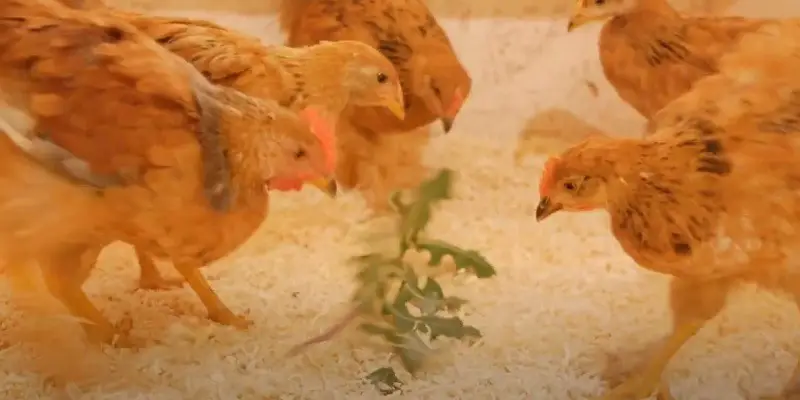Chicken coops are kept off the ground to protect the birds from predators and provide better ventilation. Elevating the coop also prevents flooding and allows for easier access for cleaning and maintenance.
This design choice ultimately ensures the safety and well-being of the chickens. Raising the chicken coop off the ground has numerous benefits for the health and safety of the birds. By elevating the coop, it helps to protect the chickens from potential predators, such as foxes or raccoons, that may otherwise easily access the coop if it were at ground level.
Furthermore, it allows for better ventilation, essential for maintaining optimal living conditions for the chickens. Additionally, keeping the coop off the ground prevents flooding during heavy rains and makes cleaning and maintenance more accessible. Overall, an elevated chicken coop is a practical and effective way to safeguard and care for the birds.
Maximizing Space And Accessibility
Utilizing Vertical Space Efficiently
Chicken coops are often built off the ground to optimize space efficiency. By elevating the coop, farmers can make the most of both horizontal and vertical space. This is especially important for small or limited areas, as it allows for more chickens to be housed without taking up excessive ground space.
Ease Of Cleaning And Maintenance
Another reason for elevating chicken coops is the ease of cleaning and maintenance it provides. When the coop is raised, it becomes more accessible for farmers to clean the floors, collect the eggs, and perform general upkeep. This not only ensures better hygiene and living conditions for the chickens but also makes the farmers’ job easier and more efficient.
Predator Protection And Health
When it comes to raising chickens, ensuring their safety and well-being is a top priority for poultry owners. One crucial aspect of safeguarding the health and protection of chickens is the decision to keep chicken coops off the ground. This proactive measure serves to address concerns related to predator protection and health maintenance, offering a range of benefits to ensure the overall welfare of the flock.
Minimizing The Risk Of Predator Attacks
Keeping chicken coops elevated reduces the likelihood of predator attacks, offering a significant advantage in safeguarding the chickens. By raising the coop off the ground, chickens are less susceptible to being targeted by ground-dwelling predators such as foxes, raccoons, and snakes, as they find it more challenging to access the elevated coop compared to one situated at ground level.
Reducing Exposure To Parasites And Diseases
Elevating the chicken coop helps in reducing exposure to parasites and diseases that thrive in the moist soil. By distancing the birds from the ground, the risk of infestation from parasites such as mites and lice is significantly decreased. Additionally, a raised coop minimizes contact with bacteria and fungi present in the soil, thereby contributing to the overall health and welfare of the flock.
Portable Coops
Portable chicken coops are a popular choice among poultry keepers for various reasons. These coops, also known as mobile or moveable coops, offer a range of benefits and practical advantages for both small-scale and larger-scale chicken farming operations. One of the key advantages of portable chicken coops lies in their mobility, which allows for greater flexibility in managing poultry and optimizing the use of land resources. In this section, we explore the advantages of mobility, as well as key considerations for designing and selecting suitable materials for portable chicken coops.
Advantages Of Mobility
Portable chicken coops offer several advantages attributed to their mobility. Their ability to be easily moved facilitates the implementation of rotational grazing systems, which can significantly benefit the health of the land and the birds. By moving the coops to different areas, chickens can have access to fresh grass and insects, preventing overgrazing and promoting natural fertilization. Additionally, mobility allows for strategic utilization of the land, enabling poultry managers to control and distribute the birds’ impact on the terrain.
Furthermore, portable coops are convenient for seasonal changes. They can be relocated to more sheltered or sun-exposed areas depending on the weather, ensuring the well-being of the poultry and optimizing environmental conditions for egg production.
Another advantage of mobile coops lies in their ease of cleaning and maintenance. With the ability to move the coops, poultry keepers can effectively avoid the buildup of waste in a particular area, reducing odors and enhancing overall hygiene.
Considerations For Design And Materials
When designing portable chicken coops, certain considerations should be taken into account to ensure their practicality and effectiveness. The weight and structural integrity of the coop are crucial factors to consider, as they impact the ease of movement and the overall durability of the structure. Additionally, the choice of materials should focus on lightweight yet sturdy options, such as treated timber or lightweight metals, to facilitate mobility without compromising the coop’s robustness.
Maneuverability is another essential aspect to consider during the design phase. Coops should be equipped with features that allow for smooth movement, such as wheels or handles, to enable ease of transportation across varying terrains.
Finally, ventilation and insulation are important considerations when selecting materials and designing the coop to ensure optimal conditions for the birds, especially during transport and changes in location.
Stationary Coops
When it comes to raising backyard chickens, one important decision you’ll make is determining the type of coop that best suits your needs. As you consider the various options, it’s essential to understand the reasons why chicken coops are often kept off the ground. This article will focus specifically on stationary coops and explore the benefits of permanent structures, flooring and foundation options.
Permanent Structure Benefits
Stationary coops, also known as permanent structures, offer an array of benefits for chicken owners. These coops are typically built to last, providing durability and stability over time. Their solid construction helps protect chickens from predators and the elements, creating a secure and comfortable environment. Additionally, permanent coops often require less maintenance compared to mobile or temporary setups, making them a practical long-term investment for backyard poultry enthusiasts.
Flooring And Foundation Options
When constructing a stationary coop, the choice of flooring and foundation is crucial to ensure the health and well-being of the flock. There are several options available, each with its own advantages. Common flooring materials include concrete, hardwood, vinyl, and wire mesh. Meanwhile, foundation options may include concrete slab, pier and beam, or wood skids. It’s important to carefully consider factors such as insulating properties, ease of cleaning, and resistance to wear and tear when selecting flooring and foundation materials for the coop.
Design And Construction
When it comes to the design and construction of chicken coops, the elevation of the coop off the ground is a critical aspect that directly impacts the well-being and safety of the chickens. Understanding the importance of this design choice can help ensure that the coop provides a comfortable and secure environment for the birds to thrive. Let’s explore the key considerations for designing and constructing an elevated chicken coop.
Choosing Appropriate Elevation Height
One of the initial decisions to make when constructing a chicken coop is the appropriate elevation height. The coop should be raised off the ground sufficiently to prevent predators from gaining easy access to the birds, as well as to provide a dry and clean environment for the chickens. Typically, a minimum height of 18 inches is recommended to allow for ventilation and reduce the risk of flooding during heavy rains.
Materials For Elevated Coop Construction
The materials used for constructing an elevated coop play a crucial role in its durability and structural integrity. Pressure-treated lumber or rot-resistant woods such as cedar are popular choices for the framework, offering longevity and protection against decay. Hardware cloth and heavy-gauge wire mesh are essential for enclosing the coop to safeguard the birds from predators. It’s also important to consider using weather-resistant roofing materials to provide adequate protection from the elements.
Incorporating Nesting Areas And Roosting Bars
When constructing an elevated chicken coop, the design should include dedicated nesting areas and roosting bars. Nesting boxes should be incorporated into the structure, providing a secluded and comfortable space for the hens to lay eggs. The roosting bars, typically placed higher within the coop, offer a resting place for the birds to perch and sleep. Ensuring the proper placement and spacing of these elements is essential to promoting natural chicken behavior and overall comfort.

Credit: www.backyardchickens.com
Frequently Asked Questions Of Why Are Chicken Coops Off The Ground?
Why Should Chicken Coops Be Off The Ground?
Chicken coops should be off the ground to protect the birds from predators and other dangers. Elevated coops also prevent moisture and drafts, keeping the chickens healthy.
How High Should A Chicken Coop Be Off The Ground?
Ideally, a chicken coop should be at least 2 feet off the ground to allow for proper air circulation, reduce dampness, and deter predators.
What Are The Benefits Of Raising A Chicken Coop Off The Ground?
Raising a chicken coop off the ground prevents water accumulation, reduces the risk of pests, and allows easy access for cleaning and maintenance.
Can Chicken Coops On The Ground Attract Predators?
Yes, chicken coops on the ground can attract predators like foxes, raccoons, and rodents, posing a threat to the safety of the birds.
What Materials Can Be Used To Elevate A Chicken Coop?
Chicken coops can be elevated using cinder blocks, wooden stilts, or adjustable legs, providing a stable and secure base for the coop.
Conclusion
Raising chicken coops off the ground ensures safety and protection for the flock. This practice aids in preventing predators, maintaining cleanliness, and creating a healthy environment for the chickens. Understanding the benefits of off-ground chicken coops is essential for successful poultry farming.
Embracing this practice can lead to overall better poultry management and improved bird health.
Last Updated on April 23, 2025 by Pauline G. Carter

